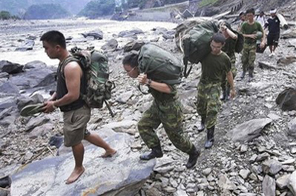4,000 still stuck in Taiwan
TAIPEI: The first shipments of foreign aid arrived Sunday as Taiwan struggled to reach more than 4,000 people still stranded a week after its deadliest typhoon in half a century.
As plastic sheeting for makeshift housing arrived from the U.S. and water purification tablets came from Australia, taxi drivers in the capital, Taipei, pitched in as well, driving rice and instant noodles to the island's hard-hit rural south.
President Ma Ying-jeou, who announced that the death toll from Typhoon Morakot was likely to exceed 500 on Friday, offered another apology for his government's slow response to the disaster after families said more people could have been saved.
"Sorry we were late," he told people in Pingtung County. "As the president, I will take full responsibility in getting the remaining work done well."
As of Saturday night, rescuers were still working to save 4,224 people from the ruins of flooded and mudslide-hit villages.
Thousands of displaced survivors remained at temporary shelters in stadiums and tent cities a week after the typhoon.
Resettlement of an estimated 7,000 people whose homes were destroyed could speed up after a batch of prefabricated houses arrives from Britain on Sunday, with more coming from China, the country's relief center said.
Taiwan's Foreign Ministry said helicopters from the U.S. that can carry cranes and backhoes were expected to arrive soon to help in rescues and in the rebuilding of roads.
More than 59 countries have offered aid, it said.
Morakot dumped more than 80 inches (two meters) of rain and stranded thousands in villages in the mountainous south. As of Saturday night, 21,199 villagers had been ferried to safety.
The storm was the island's deadliest weather disaster since 1959, when more than 600 perished in a typhoon.
The rescue operation has relied mainly on helicopters because bridges collapsed and roads were washed away. At the Cishan landing zone in the south, a main dropoff point for those rescued, hundreds have waited anxiously for days hoping to find relatives.
Among the survivors was 67-year-old Huang Jih, who walked hours to safety across the rugged terrain, carrying his mother on his back. Now he was worried about how he could support his family of seven.
"I have lost all my things," his 102-year-old mother Tseng Jih told ETTV, crying on her makeshift bed. "What am I going to wear when I die?"






